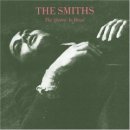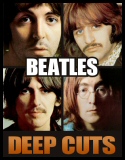Music Home / Entertainment Channel / Bullz-Eye Home
 Buy your copy from Amazon.com Buy your copy from Amazon.com
| The Smiths : The Queen is Dead Released: 1986 |
“Oh, take me back to dear old Blighty / Put me on the train for London Town / Take me anywhere /Drop me anywhere / Liverpool, Leeds or Birmingham / But I don't care…”
- “Take Me Back to Dear Old Blighty”
Every single former member of the Smiths – if you’re unsure, that consists of Morrissey, Johnny Marr, Andy Rourke, Mike Joyce, and sometimes Craig Gannon – will assure you that the band’s best album was their swan song, Strangeways, Here We Come. Don’t be swayed; they’re too close to the topic. Most Smiths fans, not to mention music critics around the world and throughout the last twenty years, have readily declared The Queen Is Dead to be the single best work the band produced in their short stint of existence…and they’re right. Sorry, guys.The opening track features Joyce’s pounding drums, Rourke’s thrumming bass, Marr’s storming guitar work, and a lyrical warning shot across the bow from Morrissey. “Farewell to this land’s cheerless marshes, hemmed in like a boar between arches,” he sings, adding, “Her very Lowness with her head in a sling / I’m truly sorry, but it sounds like a wonderful thing.” Well, of course, he’s not sorry at all…nor is he terribly happy, as is further indicated in the deceptively bouncy romp which follows. In a perfect world, “Frankly Mr. Shankly” would’ve ended up on the soundtrack to “Office Space”; certainly, no lines could be more appropriate for the film than Morrissey’s observation that “this position I’ve held, it pays my way, but it corrodes my soul,” except possibly those from the last verse, where he adds, “Frankly, Mr. Shankly, since you ask, you are a flatulent pain in the arse.”
“I Know It’s Over” may well be the single most depressing song ever composed by Morrissey, but at least its intentions are clear from the get-go, as very few cheery numbers open with the lines, “Oh, Mother, I can feel the soil falling over my head, and as I climb into an empty bed…oh, well, enough said.” And to follow it with a song entitled “Never Had No One Ever,” well, it’s no wonder people have declared Mozzer to be the Pope of Mope. Ironically, however, the song “Cemetry Gates” is actually a jangly, upbeat number which introduced many a depressed teenager to the names Keats, Yeats, and Wilde for the first time.
The riff that opens and constantly powers “Bigmouth Strikes Again” is one of Johnny Marr’s finest, but Joyce’s driving drums are nothing to sneeze at, either. The track is followed by the gentle jangle of “The Boy with the Thorn in His Side.” If there’s a duff track on the album...well, there really isn’t one, but the closest that one comes to finding one is “Vicar in a Tutu,” which is a bit slight. (There is, however, a stronger, more gruff version of the song to be found on the band’s lone authorized live album, Rank.)
Although it was never released as a single during the original release of the album (though it later emerged as such in conjunction with a best-of collection by the band), the cornerstone of The Queen Is Dead…and the song that Morrissey has, as of late, selected as the closing number of his solo concerts…is “There Is a Light That Never Goes Out.” It’s a beautifully depressing love song that runs neck in neck with “How Soon Is Now?” for the best thing ever recorded by the Smiths, with a chorus that, in just a few short lines, immaculately encapsulates the dark humor that’s inherent in so much of Mozzer’s best work:
And if a double-decker bus
Crashes into us
To die by your side
Is such a heavenly way to die
And if a ten-ton truck
Kills the both of us
To die by your side,
Well, the pleasure, the privilege is mine
As The Queen is Dead comes to an end with the silly but fun “Some Girls Are Bigger Than Others,” it’s hard to believe that so much emotional ground has been covered in just 37 minutes…from grumpy to cheery to melancholy to the slightly juvenile humor of the finale. Both musically and lyrically, it’s nothing short of a masterpiece.
wharris@bullz-eye.com






